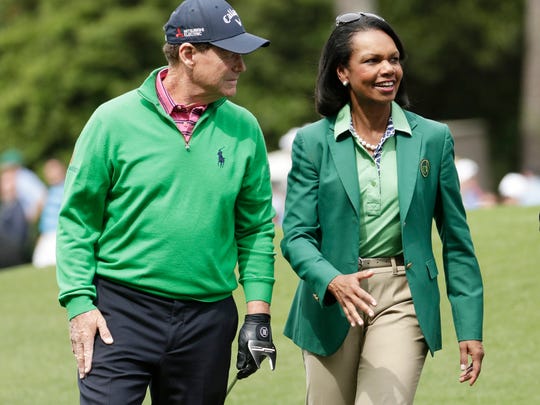It is strange how the grass, not a single blade out of place, not a chipmunk or squirrel in sight, the azaleas bursting pink — it's strange how such beauty and serenity collides with what Sage Steele calls a "disgusting" history.
The pristine Augusta National Golf Club is perfect in many ways, she said, but it is also marred. For decades, the course drew criticism for its exclusionary membership policies. A black man was not allowed until 1990. It took another 22 years for a woman to be admitted.
"It isn't the prettiest history, for sure, and that is putting it very, very kindly; therefore I feel pressure, maybe self-inflicted," said Steele, who arrived at Augusta on Monday to cover her third Masters Tournament for ESPN. "I've been nervous. I was nervous about it from the moment I got the assignment. I'm nervous out of responsibility for what it means."
ESPN's Sage Steele (left) at the Masters with Andy North. Completing the team's coverage is Curtis Strange and Tom Rinaldi. (Photo: Provided by ESPN)
Steele, who regularly anchors the 6 p.m. SportsCenter on ESPN, said it's an assignment that, unlike most parts of her career, can make her question herself.
"Should I be doing it differently? Of course not. I will go out and do the exact same job for any assignment I'm given. But are people looking at me? Do i have to be that much better?" she said. "Are they saying, 'What does she know?'"
She is proud, Steele said, to be there. She is believed to be the first black woman to cover the Masters.
"The big picture you can't ignore is that a biracial woman is covering this particular sporting event," she said. "It is is a big deal. And we should never ever forget about the past and the history there because it's kind of disgusting."
'Out of my comfort zone'
Augusta opened for play in 1933, a white-men-only club in Georgia, now one of the most famous courses in the world. While the course barred black men as members until 1990, it long required caddies to be black.
In 1975, Lee Elder made history as the first black man to play the Masters. Tiger Woods became the first to win the tournament in 1997. He and Vijay Singh are the only people of color to ever win the Masters.
With about 300 members, admittance to the club is by invitation only. Augusta invited TV executive Ron Townsend, a black man, in 1990. Two women — Condoleezza Rice and Darla Moore — became the first admitted in 2012.
(Photo: The Associated Press)
Over the weekend, the course hosted the Augusta National Women's Amateur for the first time.
After Steele's first year at the Masters in 2017, she heard a story she will never forget. A friend of hers, a white woman whose godfather is black, told Steele her godfather started crying when he saw Steele covering the Masters.
"I might be a little intimidated coming to this, but darn right I'm going to keep coming," Steele said. "I might be out of my comfort zone, but that's why i need to do it."
More with Steele at the Masters
Why Steele spent Monday at Augusta talking to researchers, walking the course:
"You have to get out on that course to be able to fully understand it," she said. "It's one of those places that you can't do it justice when you try to describe it to people. You just have to be fortunate enough to go. It's just all about the golf. It is pristine. You feel special to be there. You want to soak it all in."
What does it mean, beyond the racial history, to cover the tournament?
"Well, it's the Masters, period. It's an honor for sure. It's also pretty nerve-wracking just because of the golf history, what it means and what it stands for," she said. "When you hear all the legends and the way they talk about it, the history of what it means for the sport, it's kind of overwhelming."
For those who've never been, describe it:
"The music, the pimento sandwiches, the azaleas. You go there and it's really, you're like, 'OK. Got it. I understand,'" Steele said. "The course itself is stunning and almost somewhat eerie to me because it is so perfect. I've never been to a place before where there is not a blade of grass out of place. There is not a chipmunk, no rabbits, no squirrels."
Source: Read Full Article

